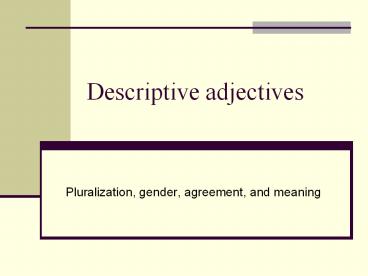Descriptive adjectives PowerPoint PPT Presentation
Title: Descriptive adjectives
1
Descriptive adjectives
- Pluralization, gender, agreement, and meaning
2
Pluralization
- We add a s to adjectives that end with a
non-accented vowel - We add an es to adjectives that end in a
consonant or an accented vowel - If an adjective ends with the letter z, then we
erase the z and add ces
ambicioso ambiciosos
interesante interesantes
egoísta egoístas
trabajador trabajadores
marroquí marroquíes
laboral laborales
capaz capaces
falaz falaces
feliz felices
3
Gender
- The majority of the adjectives that end with a
are feminine. - Una gente diversa
- Una persona honesta
- The majority of the adjectives that end with o
are masculine. - Un país muy diverso
- Un hombre honesto
- Adjectives ending in ista o ta can be
masculine or feminine. - Un hombre idealista, la mujer idealista
- Los países capitalistas, las compañías
capitalistas - El político demócrata, la organización demócrata
- Adjectives ending in e or a consonant do not
express genderthey only have two forms
singular and plural. - Una profesora inteligente, un profesor
inteligente, las niñas inteligentes, los
estudiantes inteligentes - Una persona útil, un carro útil, unas
herramientas útiles, unos trucos útiles - A group of adjectives that ends with a consonant
(those that express nationality or end with
dor), have a special feminine ending. - Una estudiante alemana
- Dos novelas españolas
- Una persona muy trabajadora
4
Agreement
- Adjectives and nouns agree in grammatical number
and gender. - Rosas rojas
- Clavel perfumado
- An adjective that refers to two or more nouns
needs to be pluralized. - Cielo, paisaje y mar sureños.
- Canción y copla nostálgicas.
- An adjective that refers to two nouns with
different genders has to take the masculine
gender. - Viento y lluvia huracanados.
- Romance y balada antiguos.
5
Agreement Special Cases
- The adjective with two forms (the short preceding
form and long suceding form). - There is a group of adjectives that have two
forms. We use the short form before a noun and
the long form after the noun. - Un buen hombre / un hombre bueno
- Un gran evento / un evento grande
- Un mal agüero / un agüero malo
- The adjective santo
- We use Santo only when the word procedes a name
that begins with To o Do - San Juan
- Santo Tomás
- Santo Domingo
- An adjective that modifies various nouns
- A suceding adjective agrees in singular with the
collective noun or in plural with the complement
of a noun. - Tropel de palabras injusto, impropio. (con el
sustantivo colectivo) - Tropel de palabras injustas, impropias. (con el
complemento del sustantivo) - A preceding adjective that modifies various
nouns. - The adjective agrees only with the noun that is
closest to it in proximity. - la preceptiva autorización y control médicos
- The adjective agrees in number with both nouns
only when it refers to two people. - los simpáticos Paco y Toni
6
Location and descriptive meaning
- Adjectives almost always follow the noun that
they describe in Spanish, because they are
restricted to describing its real or
objectively observable characteristics. - Un amigo bueno
- Una voz rara
- Unos carros verdes
- When we express quantity, however, we have to
make sure the adjective precedes the noun it
describes. - Primer viaje
- Varios amigos
- Poco tiempo
- Otra lección
- Algún día
- Esta camisa / aquél sombrero
- Also, if we want to call attention to a noun for
explicative or emotional reasons, we need to
place the adjective before the noun. - El extravagante negociante
- El mejor amigo
- La conocida escritora
- La blanca nieve (sentido poético)

